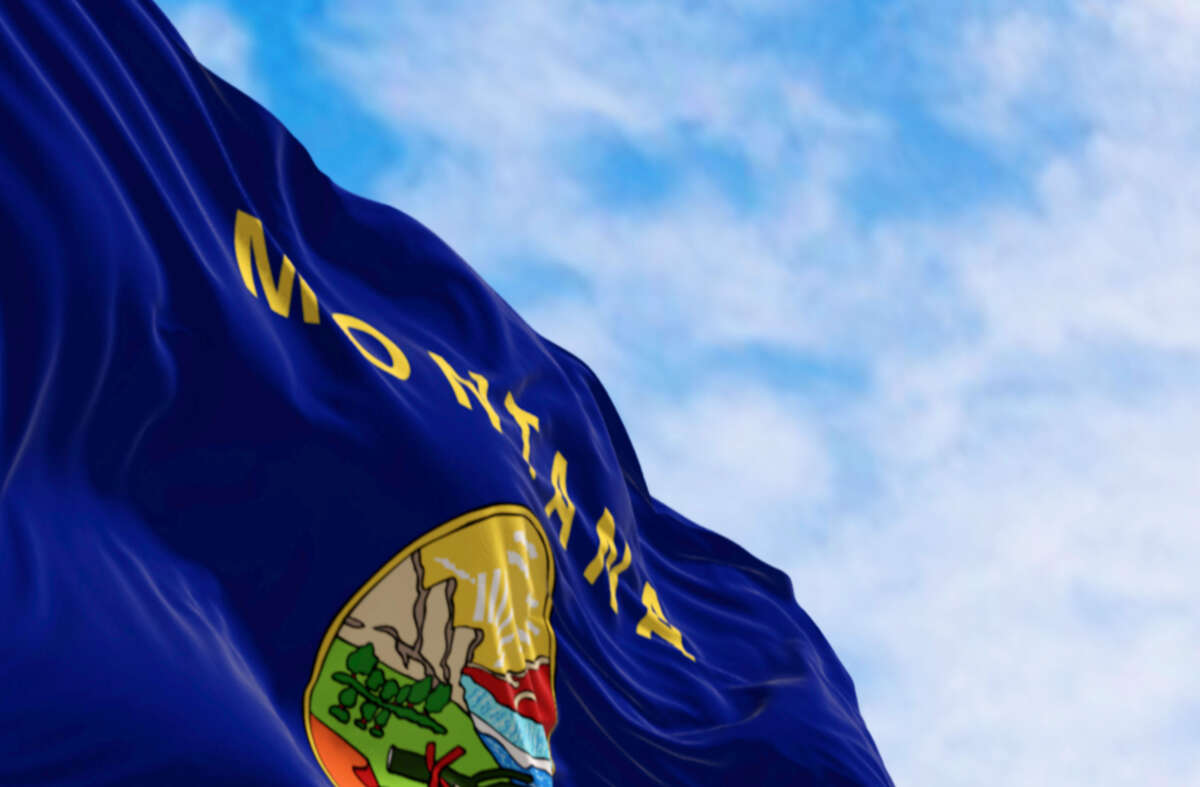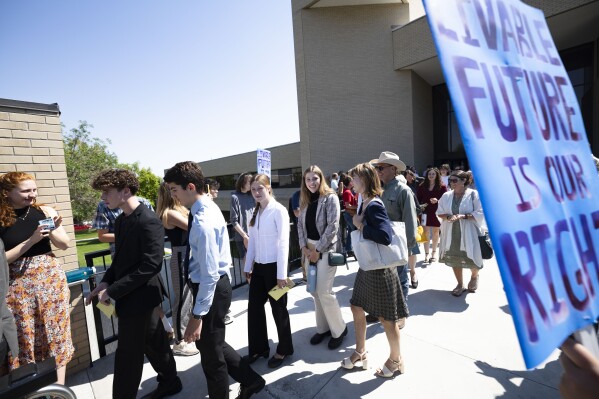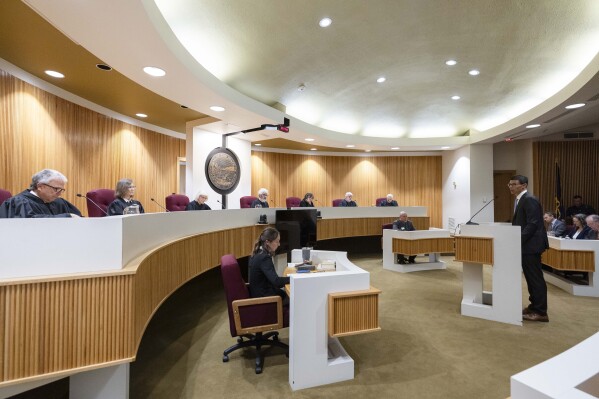The ruling is a victory “for every young person whose future is threatened by climate change,” one petitioner said.
By Chris Walker ,
PublishedDecember 19, 2024

On Wednesday, the Montana State Supreme Court ruled to keep intact a lower court’s decision from last year, which found that a law banning state lawmakers from considering greenhouse gas emissions when permitting fossil fuel projects was unconstitutional.
The lower court ruling was made in late 2023, after 16 young petitioners sued the state on the grounds that a state law allowing such permits to be considered violated the Montana constitution’s provision on ensuring a “clean and healthy environment…for present and future generations.” Republican lawmakers sued to have that order rejected, and in July, the state Supreme Court heard oral arguments on the matter.
In a 6-1 decision, the court found that the original ruling was sound, and that the petitioners’ rights had been violated. Chief Justice Mike McGrath authored the opinion of the court, stating that the “right to a clean and healthful environment and environmental life support system includes a stable climate system.”
Notably, within the first trial in 2023, the state refused to present any climate science whatsoever in favor of keeping the Montana law in place.
Rikki Held, one of the young petitioners in the case, lauded the action from the state Supreme Court.

In Major First, Judge Rules in Favor of Montana Youth Suing Over Climate Crisis
A judge has ruled that officials’ failure to address the climate crisis violated constitutional rights. By Sharon Zhang , Truthout August 15, 2023
“This ruling is a victory not just for us, but for every young person whose future is threatened by climate change,” Held said.
Nate Bellinger, a lawyer with Our Children’s Trust, one of the organizations that represented the youth, also celebrated the case’s outcome. The ruling “affirmed the constitutional rights of youth to a safe and livable climate,” Bellinger said.
While the ruling is a huge win for young people and climate advocates, it does not require the state to take proactive steps to address the crisis, such as passing legislation to mitigate the effects of climate change. Still, the Montana Supreme Court’s decision means that the permitting process must take into consideration how a particular project may contribute to the rise in greenhouse gases, providing a mechanism for residents to sue if the state ignores the standard.
While its numbers have lessened somewhat over the past few years, Montana’s output of carbon emissions has more than doubled since 1970. Only 14 states in the U.S. have seen emission rates go down during that time frame, while the remaining 36 states have seen emissions numbers increase.
This article is licensed under Creative Commons (CC BY-NC-ND 4.0), and you are free to share and republish under the terms of the license.

Chris Walker is a news writer at Truthout, and is based out of Madison, Wisconsin. Focusing on both national and local topics since the early 2000s, he has produced thousands of articles analyzing the issues of the day and their impact on the American people. He can be found on most social media platforms under the handle @thatchriswalker.
Global warming can’t be ignored, Montana’s top court says, upholding landmark climate case

Youth plaintiffs in the Held v. Montana climate case leave the Montana Supreme Court, on July 10, 2024, in Helena, Mont. (Thom Bridge/Independent Record via AP, File)

Dale Schowengerdt, representing Montana Gov. Greg Gianforte and state environmental agencies, argues before the Montana Supreme Court, on July 10, 2024, in Helena, Mont., in the youth climate lawsuit Held v. Montana. (Thom Bridge/Independent Record via AP, File)
BY AMY BETH HANSON
December 18, 2024
HELENA, Mont. (AP) — Montana’s Supreme Court on Wednesday upheld a landmark climate ruling that said the state was violating residents’ constitutional right to a clean environment by permitting oil, gas and coal projects without regard for global warming.
The justices, in a 6-1 ruling, rejected the state’s argument that greenhouse gases released from Montana fossil fuel projects are minuscule on a global scale and reducing them would have no effect on climate change, likening it to asking: “If everyone else jumped off a bridge, would you do it too?”
The plaintiffs can enforce their environmental rights “without requiring everyone else to stop jumping off bridges or adding fuel to the fire,” Chief Justice Mike McGrath wrote for the majority. “Otherwise the right to a clean and healthful environment is meaningless.”
Only a few other states, including Hawaii, Illinois, Pennsylvania, Massachusetts and New York, have similar environmental protections enshrined in their constitutions.
The lawsuit filed in 2020 by 16 Montanans —who are now ages 7 to 23 — was considered a breakthrough in attempts by young environmentalists and their attorneys to use the courts to leverage action on climate change.
RELATED STORIES

Young activists take on a government agency in a Florida climate lawsuit

Multilateral banks are key to financing the fight against global warming. Here is how they work

Biden's public lands director named to lead environmental group
“This ruling is a victory not just for us, but for every young person whose future is threatened by climate change,” lead plaintiff Rikki Held said in a statement Wednesday.
During the 2023 trial in state District Court, the young plaintiffs described how climate change profoundly affects their lives: worsening wildfires foul the air they breathe, while drought and decreased snowpack deplete rivers that sustain farming, fish, wildlife and recreation and affect Native traditions.
Going forward, Montana must “carefully assess the greenhouse gas emissions and climate impacts of all future fossil fuel permits,” said Melissa Hornbein, an attorney with the Western Environmental Law Center and attorney for the plaintiffs.
Republican Gov. Greg Gianforte said the state was still reviewing the decision, but warned of “perpetual lawsuits that will waste taxpayer dollars and drive up energy bills for hardworking Montanans.”
“This decision does nothing more than declare open season on Montana’s all-of-the-above approach to energy,” he said, which promotes using both fossil fuels and renewables.
A day earlier, Gianforte held meetings on how the state can increase energy production, which involved energy suppliers, large energy consumers, public utility companies, transmission stakeholders and legislators.
Incoming Senate President Matt Regier and House Speaker Brandon Ler, both Republicans, joined Gianforte in alleging the justices were overstepping their authority and had strayed into making policy.
“Judicial reform was already a top priority for Republican lawmakers,” Regier and Ler said, warning the justices to “buckle up.”
Montana courts have blocked or overturned numerous laws passed by Republicans in the 2021 and 2023 legislative sessions as being unconstitutional, including laws to limit access to abortion.
In seeking to overturn the District Court ruling, the state had argued the plaintiffs should be required to challenge individual fossil fuel development permits as they’re issued — which would have involved trying to challenge even smaller amounts of emissions.
Carbon dioxide, which is released when fossil fuels are burned, traps heat in the atmosphere and is largely responsible for the warming of the climate. June brought record warm global temperatures for the 13th straight month, according to European climate service Copernicus. The streak ended in July.
Montana’s Constitution requires agencies to “maintain and improve” a clean environment. A law signed by Gianforte last year said environmental reviews may not consider climate impacts unless the federal government makes carbon dioxide a regulated pollutant. The Montana Supreme Court’s ruling found that law to be unconstitutional.
Youth plaintiffs in the Held v. Montana climate case leave the Montana Supreme Court, on July 10, 2024, in Helena, Mont. (Thom Bridge/Independent Record via AP, File)
Dale Schowengerdt, representing Montana Gov. Greg Gianforte and state environmental agencies, argues before the Montana Supreme Court, on July 10, 2024, in Helena, Mont., in the youth climate lawsuit Held v. Montana. (Thom Bridge/Independent Record via AP, File)
BY AMY BETH HANSON
December 18, 2024
HELENA, Mont. (AP) — Montana’s Supreme Court on Wednesday upheld a landmark climate ruling that said the state was violating residents’ constitutional right to a clean environment by permitting oil, gas and coal projects without regard for global warming.
The justices, in a 6-1 ruling, rejected the state’s argument that greenhouse gases released from Montana fossil fuel projects are minuscule on a global scale and reducing them would have no effect on climate change, likening it to asking: “If everyone else jumped off a bridge, would you do it too?”
The plaintiffs can enforce their environmental rights “without requiring everyone else to stop jumping off bridges or adding fuel to the fire,” Chief Justice Mike McGrath wrote for the majority. “Otherwise the right to a clean and healthful environment is meaningless.”
Only a few other states, including Hawaii, Illinois, Pennsylvania, Massachusetts and New York, have similar environmental protections enshrined in their constitutions.
The lawsuit filed in 2020 by 16 Montanans —who are now ages 7 to 23 — was considered a breakthrough in attempts by young environmentalists and their attorneys to use the courts to leverage action on climate change.
RELATED STORIES
Young activists take on a government agency in a Florida climate lawsuit
Multilateral banks are key to financing the fight against global warming. Here is how they work
Biden's public lands director named to lead environmental group
“This ruling is a victory not just for us, but for every young person whose future is threatened by climate change,” lead plaintiff Rikki Held said in a statement Wednesday.
During the 2023 trial in state District Court, the young plaintiffs described how climate change profoundly affects their lives: worsening wildfires foul the air they breathe, while drought and decreased snowpack deplete rivers that sustain farming, fish, wildlife and recreation and affect Native traditions.
Going forward, Montana must “carefully assess the greenhouse gas emissions and climate impacts of all future fossil fuel permits,” said Melissa Hornbein, an attorney with the Western Environmental Law Center and attorney for the plaintiffs.
Republican Gov. Greg Gianforte said the state was still reviewing the decision, but warned of “perpetual lawsuits that will waste taxpayer dollars and drive up energy bills for hardworking Montanans.”
“This decision does nothing more than declare open season on Montana’s all-of-the-above approach to energy,” he said, which promotes using both fossil fuels and renewables.
A day earlier, Gianforte held meetings on how the state can increase energy production, which involved energy suppliers, large energy consumers, public utility companies, transmission stakeholders and legislators.
Incoming Senate President Matt Regier and House Speaker Brandon Ler, both Republicans, joined Gianforte in alleging the justices were overstepping their authority and had strayed into making policy.
“Judicial reform was already a top priority for Republican lawmakers,” Regier and Ler said, warning the justices to “buckle up.”
Montana courts have blocked or overturned numerous laws passed by Republicans in the 2021 and 2023 legislative sessions as being unconstitutional, including laws to limit access to abortion.
In seeking to overturn the District Court ruling, the state had argued the plaintiffs should be required to challenge individual fossil fuel development permits as they’re issued — which would have involved trying to challenge even smaller amounts of emissions.
Carbon dioxide, which is released when fossil fuels are burned, traps heat in the atmosphere and is largely responsible for the warming of the climate. June brought record warm global temperatures for the 13th straight month, according to European climate service Copernicus. The streak ended in July.
Montana’s Constitution requires agencies to “maintain and improve” a clean environment. A law signed by Gianforte last year said environmental reviews may not consider climate impacts unless the federal government makes carbon dioxide a regulated pollutant. The Montana Supreme Court’s ruling found that law to be unconstitutional.
No comments:
Post a Comment